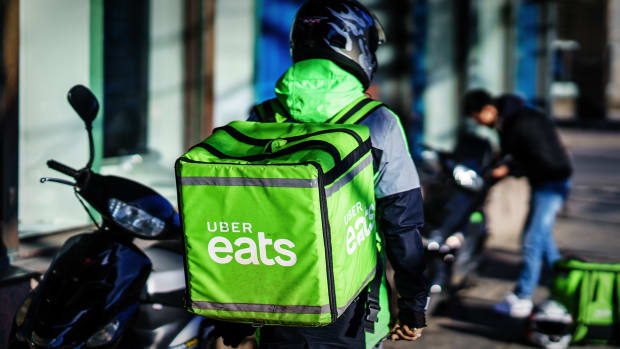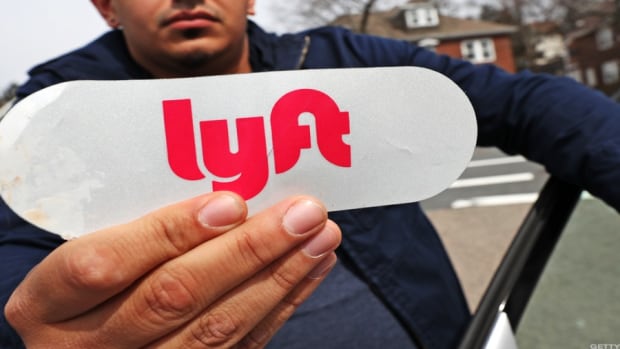Shares of ride-hailing lynchpins Uber (UBER) and Lyft (LYFT) were both on the rise Thursday following strong fourth-quarter earnings numbers that showed both companies are on the post-pandemic road to recovery.
Yet the duo, both of which continue to operate at a net loss, remain locked in a fierce battle for market share, raising a question that has certainly been discussed before: Could the two biggest ride-sharing companies combine forces?
On the surface, it makes sense. Uber and Lyft were founded on the near-identical premise that hailing a cab was archaic and that technology could bring together people looking for a ride with people looking to make money. Merged, they'd join forces as one big happy lot.
And the drivers the two companies rely on to keep their coffers padded are certainly simpatico. Food-delivery and ride-sharing giants, the so-called gig-economy companies, have joined hands and are pouring in millions of dollars to beat back challenges to their business models, specifically treating their drivers as independent contractors as opposed to full-time employees.
'Ride-sharing stalwarts Lyft and Uber are going after market share in a Game of Thrones environment despite clear challenges ahead.' - Wedbush analyst Daniel Ives.
In practice, and despite years of speculation from Wall Street, Main Street and everywhere in between, that an UberLyft would make sense, the two San Francisco companies have staunchly and steadfastly remained archrivals. And they seem quite happy about it -- despite the fact that neither of them has ever made a solid or consistent profit.
Lyft Reports Loss; Shares Rise
On Tuesday after the closing bell on Wall Street, Lyft reported a fourth-quarter net loss of $258.6 million.
Lyft shares at last check were up about 1% after gaining more than 5% on Wednesday.
While that loss narrowed from the $458.2 million net loss it posted in the year-earlier period, it was still a loss, as the company continued to struggle with fewer riders looking to get around in a world still dominated and dictated by the pandemic.

Shutterstock
Uber on Thursday posted stronger-than-expected fourth quarter earnings, eking out a small adjusted profit of $82 million for the three months ending in December, its second profitable quarter in a row.
Delivery revenue, which includes Uber Eats, rose 78% to $2.42 billion, the company said. Uber shares at last check were up more than 5% Thursday.
Part of the reason Uber and Lyft haven't considered joining forces is that both had their sights on minting cash from going public. Lyft's March 2019 IPO netted the company a cool $2.3 billion, giving it a market valuation of $22.2 billion. The stock rose about 8% on its first day of trading but then began to slide as investors realized that it too wasn’t making a profit.
TheStreet recommends: How Much Do Lyft and Uber Drivers Make?
Hell No, Let's IPO
Not helping was a complaint that it made inaccurate and misleading claims about its business in its filing to go public, causing its stock price to be artificially inflated.
Right behind Lyft, Uber saddled up to the IPO spotlight in May 2019 in one of the most highly anticipated public offerings of that year. It had an out-of-the-gate valuation of around $68 billion.
It also made history as the biggest first-day dollar loss in IPO history in the U.S., since it was expected to hit a valuation of about $120 billion. Instead, it shed about $12 billion in market value in its first day of trading on May 10, 2019.

But both companies went their respective ways, chugging along through antitrust and labor challenges and disputes and, of course, the pandemic, which slammed the proverbial door on a significant part of both companies’ businesses.
For its part, Uber has taken a different approach all along: to be a delivery company of not just people but food and packages. The company has put its IPO-generated war chest of cash to work, buying up the likes of Careem, Postmates and Raiser, and pouring cash into Uber Eats and Uber Freight to balance its business.
Lyft has taken a very different road, focusing instead making sure its pink logo is in plain sight wherever rival Uber operates. It also focuses on making its ride-sharing experience better and cheaper -- a tough goal in a market where the ride that shows up first and is cheapest wins.
Whether that's working from a financial standpoint is questionable. Lyft reported 18.73 million active riders in the last quarter of 2021, lower than the prior quarter and below analysts’ expectations.
The Battle of Winterfell
In its most recent quarter, Uber reported 109 million "monthly active platform users," which includes any person or object or bag of McDonald's that took a ride in an Uber. Total trips rang in at 1.64 billion, completely shading Lyft.
Lyft also is known for its anti-Uber culture, which it claims extends from the C-suite to the road -- not just because it sees itself as the underdog, but because it truly feels it provides a different experience to both its drivers and passengers.
Wouldn’t it make sense for the two rivals to merge? To the average Lyft and Uber ride-hailing user and to the general public, maybe. Lyft itself isn't ignoring some of the markets Uber continues to diversify into: The company more recently has teed up self-driving and restaurant delivery partners to bring more Uber-like offerings.
Still, to anyone on Wall Street and beyond looking more closely at both companies' balance sheets and prospects for app-driven people, food and goods delivery globally, the prospect of a "Luber" is about as likely as the possibility of an "AmazApple."
“Ride-sharing stalwarts Lyft and Uber are going after market share in a Game of Thrones environment despite clear challenges ahead,” Wedbush analyst Daniel Ives told TheStreet.
“Antitrust issues, strategic differences, and treasure chests full of cash make the prospects of a combination basically impossible from our perspective.”







